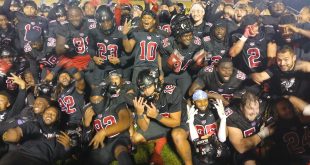By Maura Lerner Star Tribune (Minneapolis) / (MCT)
Controversial professor Steven Salaita, who lost his job offer from the University of Illinois after criticizing Israel on social media, lashed out at university administrators Monday for overreaching in their decision not to hire him.
Salaita, in a wide-ranging, 40-minute speech at Northwestern University, the first of several talks planned at Chicago-area campuses this week, focused on academic freedom and the recent conflict in the Middle East. He made comparisons between his own situation and the subject of colonialism that he studies, saying that the university was suppressing a minority position.
“Watching my own firing happen publicly on the Internet was surreal, but not just for me,” he told a largely supportive crowd that filled most of a 300-seat lecture hall. “Anyone who tuned in could see how the corporatization of academe functions in real time.”
In early August, U. of I. chancellor Phyllis Wise revoked Salaita’s job offer, a tenured position in the American Indian studies department, weeks before he was to start and after a series of controversial tweets he posted over the summer about Israeli military action in Gaza, some of which contained vulgar or inflammatory language. The U. of I. board of trustees backed her in an 8-1 vote, a decision that led to criticism from faculty nationally who say U. of I. is violating free speech and academic freedom.
Salaita, a Palestinian-American who studies colonialism and the Middle East, on Monday criticized U. of I. board members, who he said “have zero qualifications to evaluate my teaching or scholarship,” and universities more broadly for everything from “siding with Israel” to high administrative salaries and the reliance on part-time adjunct faculty. He said he is not anti-Semitic, as some have said, but that he “opposes the policies of the state of Israel.”
Salaita has described his tweets as “passionate and unfiltered,” and many of the ones preceding his job revocation focused on the number of children killed in the conflict this summer.
One of his more controversial posts was written in June, soon after three Israeli teens were kidnapped and later found dead. He wrote: “You may be too refined to say it, but I’m not: I wish all the (expletive) West Bank settlers would go missing.”
Marc Feldman, who said he drove five hours from Cleveland to attend Salaita’s speech, challenged Salaita on his views about Israel and those who support the country.
Mirroring comments he made on Twitter, Salaita responded: “It is impossible to support Israeli policy without also implicitly supporting the deaths of those children. The two things go together. I don’t feel like you can separate them. It is those policies of the state that led to the deaths of those children, the murder of those children,” he said.
Salaita canceled a scheduled appearance Tuesday at the University of Illinois at Chicago, a possible sign that he and the university are discussing a financial settlement. He also is scheduled to speak this week at the University of Chicago, Columbia College and DePaul University.
“Because of Professor Salaita’s desire to work with the students, faculty and administration at Illinois, we believe it is in his best interests at this point to avoid any perception that speaking on campus could be viewed as antagonistic,” said Salaita’s attorney, Anand Swaminathan, of the Chicago law firm Loevy & Loevy.
Swaminathan has said he is preparing a lawsuit against U. of I. for violating Salaita’s constitutional rights to free speech and due process as well as breach of contract.
He said Salaita “remains steadfast in his desire” to have the tenured position at U. of I., “whether it is done voluntarily or through the legal process.”
Salaita, 38, had resigned from his tenured job at Virginia Tech University last spring in preparation for the move to Urbana-Champaign, and now he and his family are living with his parents in the Washington, D.C., area. The groups organizing his speaking tour this week -Students for Justice in Palestine and the group Gay Liberation Network – have been collecting funds to offer him an honorarium.
U. of I. spokesman Thomas Hardy pointed Monday to statements previously made by university officials when they declined to hire Salaita.
“Professor Salaita’s approach indicates that he would be incapable of fostering a classroom environment where conflicting opinions could be given equal consideration, regardless of the issue being discussed,” President Robert Easter said last month. “I am also concerned that his irresponsible public statements would make it more difficult for the University and particularly the Urbana-Champaign campus to attract the best and brightest students, faculty and staff.”
When asked Monday by an audience member whether he would advise others to “shut up and not make waves” in light of his situation, Salaita said there are many ways to advocate for change.
“There are ways to be active, to work for change, that don’t necessarily involve being public. You don’t have to run your mouth on Twitter like I did,” he said.
He then concluded: “I chose to do what I did. I am still, sitting here, happy with the decision.”
___
(c)2014 Chicago Tribune
 The Spectator The independent student newspaper of Valdosta State University
The Spectator The independent student newspaper of Valdosta State University



